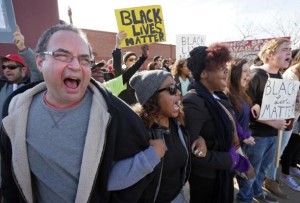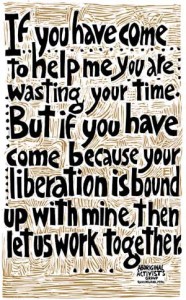Entering Silently, Listening to Learn and Building Authentic Relationships:
By Jason Sawyer | RACE
 This is the second piece of a three part series on navigating difference in community organizing and social justice work. Targeted at members of my own community, it covers seven essential tools in moving through the process of ally consciousness. Part one centered on acknowledging privilege and unearned social power. Part two focuses on humility and empathy.
This is the second piece of a three part series on navigating difference in community organizing and social justice work. Targeted at members of my own community, it covers seven essential tools in moving through the process of ally consciousness. Part one centered on acknowledging privilege and unearned social power. Part two focuses on humility and empathy.
Unpacking our privilege begins with an honest critique of our own experience as white people. Even as we enter silently, dialogue with others, and listen to learn, we cannot expect people of color to teach us how not to be racist. We can learn from the experiences of others who are not like us, but we can learn just as much, from a rigorous analysis of our own experiences as white people. We need to ask ourselves: what does it mean to be white in America? Where did I come from? Who are my ancestors? What do I have as a result of where I come from? When we begin to look deeply into these questions, we begin to gain insight into how our family of origin, our skin color, and in many cases our class has contributed to the unearned components of our social status. It is only when we begin to critique our own experience that we can acknowledge our privilege, begin to dismantle it, and move toward liberation.
Likewise, we cannot take part in honest, rigorous critique without the ability to remain humble in the face of great frustration. Being humble means simply to remain teachable. There is nothing more frustrating for people who have been oppressed and marginalized by systems of power than to have someone who wants to help them – particularly someone who looks, walks, talks, and shares the same cultural background as the oppressor – come in and tell them what they need to do. As people, we all may share our humanity, but we definitely have not shared the same experiences, culture, and background. We have not experienced the world, culture, and life in the same way as people who are different from us. This is particularly true if we occupy a privileged status, which in the United States is generally white, male, able-bodied, middle aged, and educated.
Remaining teachable also helps us to learn from other allies who have worked in the field to show us the way, preferably before entering a community as a helper. We can look to other allies who have historically been engaged in the process of traditionally working in those fields and allies who are doing it currently. Not only do we need to look to mentors, but we need to read books written by people like Myles Horton, Paul Kivel, Tim Wise, and others and reach out to groups focused on ally-ship. We can also read the work of the many critical race theorists, sociologists, activists, artists, and scholars who study race and oppression. Some who have influenced me are Patricia Hill Collins, bell hooks, Cornel West, Ella Baker, W.E.B. DuBois, Paulo Freire, August Wilson, Langston Hughes, James Baldwin, Richard Wright, and Michael Eric Dyson. This is necessary for our own intellectual and practical development, and the need for it cannot be overstated.
We need to be learners even if we have been deemed by some outside authority as someone who can come in to help the community. We need to be learners, and work to allow the community to lead us. We also need to be constantly reminded of that fact. If we do not keep in mind that we are the learners and the community members are our teachers, then the process of engagement to transformation is at best impeded and, at its worst, a repetition of past oppressions. We wear the scars of our miseducation, and once we are able to acknowledge that, we can open ourselves to new experiences, new ways of knowing, and be challenged without getting defensive.
 Empathy is the antidote to defensiveness. We must fight the instinct to be defensive, to defend ourselves as not being part of the system, or not being like those other misguided people who look like us, or to minimize tragedy by pointing out that “most white people aren’t that way”. These sentiments too often make matters worse. Getting defensive is not helpful. I have damaged many of the relationships created in community through my own defensiveness, through my own need to say, “I meant well, and it’s not my fault”. It only breeds more blame, more shame, more guilt, and disgust. It gets in the way of true active listening. It takes the focus away from social change, conciliation, and collective liberation to our own denial. It also gets in the way of our own learning. Although our instinct may be to get defensive, it only keeps us from acknowledging those things within ourselves, our families, and our friends that we need to work to change. Our own thinking and actions will only change with the accumulation of new knowledge based on an accurate analysis of history (even the history we do not wish to look at or wrestle with), an analysis of various systems of power, an analysis of the experience of people different from ourselves, an examination of our role in a pervasive system of oppression, and an analysis of our own experiences as white people, or whatever complex dimensions of privilege we may possess. It may not be white privilege, it may be economic privilege, religious privilege, heteronormative privilege, or whatever unearned social benefits come from our social position.
Empathy is the antidote to defensiveness. We must fight the instinct to be defensive, to defend ourselves as not being part of the system, or not being like those other misguided people who look like us, or to minimize tragedy by pointing out that “most white people aren’t that way”. These sentiments too often make matters worse. Getting defensive is not helpful. I have damaged many of the relationships created in community through my own defensiveness, through my own need to say, “I meant well, and it’s not my fault”. It only breeds more blame, more shame, more guilt, and disgust. It gets in the way of true active listening. It takes the focus away from social change, conciliation, and collective liberation to our own denial. It also gets in the way of our own learning. Although our instinct may be to get defensive, it only keeps us from acknowledging those things within ourselves, our families, and our friends that we need to work to change. Our own thinking and actions will only change with the accumulation of new knowledge based on an accurate analysis of history (even the history we do not wish to look at or wrestle with), an analysis of various systems of power, an analysis of the experience of people different from ourselves, an examination of our role in a pervasive system of oppression, and an analysis of our own experiences as white people, or whatever complex dimensions of privilege we may possess. It may not be white privilege, it may be economic privilege, religious privilege, heteronormative privilege, or whatever unearned social benefits come from our social position.
Empathy grounds us in the strength of our compassion. We are not to blame for the past mistakes of our forbearers. Therefore, we do not have to defend their actions. We are responsible for doing our part to change the unequal social systems that arose as a result of their actions. This includes the systems that privilege one group over another. When partners in the struggle call us to task, they are asserting their humanity just as people of color have in their fight against racial oppression for the past 400 years. Empathy allows us to see that. In practicing empathy, we are not joining people in their suffering. We are practicing listening to learn, and allowing others’ experiences to guide us in how we justly respond to difficult situations and experiences. We do not question their experiences as ingenuous or judge their responses as inaccurate. We listen and empathize in order to match our intention with the impact of our behavior.